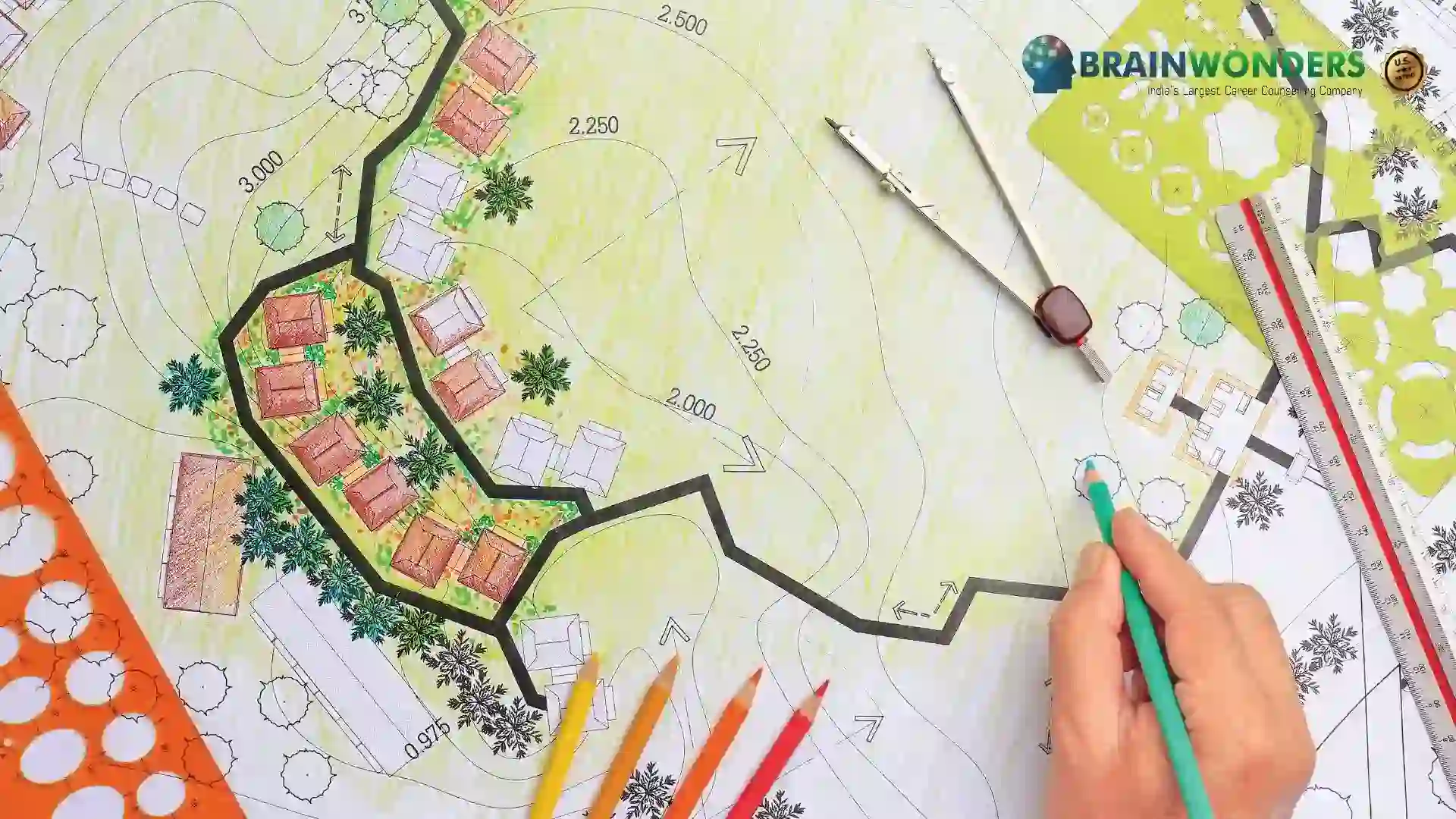How to become an Architect
Overview, Courses, Exam, Colleges, Pathways, Salary

Overview
Who is Architect ?
Architects and scientists work together to create places where people can live, eat, work, and play, as well as places where they can work and play. They combine art and science to create places where people can live, eat, work, and play. The work of an architect encompasses a broad variety of projects, ranging from something as basic as an extension to a person`s house to something as complicated as the design of a hospital, a college campus, or an entire neighbourhood. Bringing the client`s creative ideas and visions together while also considering the requirements of others who will be using the new area is their responsibility. An architect is an expert in the construction sector who is responsible for creating new buildings that are innovative and functional, as well as cost-effective and aesthetically pleasing.
Structural engineers are another term for these professionals. Additionally, these specialists are involved in redevelopment projects and those that are centred on the restoration or preservation of historic buildings, as well as alternations, restorations, and additions to existing structures. In this capacity, they must collaborate with a diverse group of professionals, including building service engineers, architectural technologists, quantity surveyors, and construction managers. They are engaged in the construction process from the beginning to the conclusion. Homes, apartment complexes, corporate buildings, restaurants, industries, schools, and healthcare facilities are just a few examples of the kind of structures on which they have worked.
As an architect, you are concerned not only with the design`s aesthetic appeal and utility, but you are also concerned with the design`s environmental impact and long-term viability. In other words, you are concerned with the design`s overall sustainability. Having worked closely with clients on a number of projects, they begin by identifying the needs and resources available for developing designs that are suited to the customer`s expectations.
Typical day at work
What does Architect do?
- Consult with clients and specify the objectives, requirements, and financial plans of the project
- Create detailed blueprints, conceptual plans, renderings, and other construction documents
- make adjustments as per the client’s needs, resources and constraints as necessary
- Creating building designs and plans using specialist software, cloud-based technologies, or by hand
- Ensuring that the architectural designs align with the client’s needs and budget
- Visiting the construction site periodically to check project status
- Keep up to date with current trends in architecture and construction
- Ensure that the construction work adheres to the specific standards, guidelines, and laws laid down by the regulatory bodies
- Resolve complex design issues as they occur during the construction phase
- Organize, manage, and file permit applications
Abilities and Aptitude needed
What are the skills, abilities & aptitude needed to become Architect?
Architects go through a rigorous training programme that helps them enhance their technical knowledge while also honing their creativity. They should be imaginative and forward-thinking, as well as visually appealing. Both your aesthetic and technical abilities will benefit from architectural instruction, which will help you nurture and develop them both. Because so much of their work is collaborative, the ability to operate as a team, as well as the capacity to manage a team with leadership qualities, becomes more important.
To effectively create a design and see a project through to completion, an architect must be able to comprehend what all of these individuals are saying and communicate with them clearly in return This profession also requires excellent communication and interpersonal skills. A good problem solver should be analytical, systematic, and able to think critically under pressure. The architect's ability to organise their work meticulously and handle projects effectively will be critical in ensuring the efficiency of their job. Additionally, they should be able to handle their obligations while adhering to strict time and financial restrictions. Although the architect's designs should be original, they should also be useful and consider the social and/or environmental consequences of their projects.
To carry out the duties that an architect's employment requires, mathematical ability and working knowledge of computer-aided design tools such as AutoCAD are essential. You'll need a solid foundation in geometry, mathematics, physics, and more complex math ideas before you can begin. They should be well-versed in the appropriate rules and regulations, as well as construction codes, among other things. Zoning regulations and construction rules determine a great deal about what may be constructed, where it can be built, and how it can be built. In certain cases, these restrictions are directly related to the architect's work, such as the number and size of windows that must be used in different building types.
Salary
Salary for Architect?
The salary of an "Architect" can vary significantly based on factors such as experience, qualifications, location, the size of the firm, and the type of projects they work on.
- Minimum Monthly Salary: The minimum salary can be from INR 25,000 to INR 40,000.
- Maximum Monthly Salary: The maximum salary can be from INR 1,00,000 to INR 2,50,000 or more.
- Annual Salary: The annual salary can be from INR 3,00,000 to INR 30,00,000 or more.
- Highest Paying Job and Scope: The highest paying job for architects is often the role of a Senior Architect or Principal Architect in a reputable architectural firm. The scope for architects is diverse, and they can find employment in architectural firms, construction companies, real estate development, government agencies, and self-employment as independent consultants.
Pathways
How to become an Architect?
Entrance Exam
Entrance Exam for Architect ?
FOR GRADUATION
- National Aptitude Test for Architecture-NATA
- JEE Main (Paper 2)
- COMEDK
- JEE Advanced-
- Architecture Aptitude Test (AAT)
- BITSAT
- Maharashtra Architecture Common Entrance Test (MH Arch CET)
- Satyabhama Entrance Exam
- DASA UG and PG Direct
AFTER GRADUATION-
- Graduate Aptitude Test in Engineering (GATE)
- Common Entrance Examination for Design (CEED)
Courses
Which course I can pursue?
Best Colleges
Which are the best colleges to attend to become an Architect?
Industries
Which Industries are open for Architect?
- Architectural technologist
- CAD technician
- Fire risk assessor
- Interior and spatial designer
- Urban designer
- Higher education lecturer
- Historic buildings inspector/conservation officer
- Landscape architect
- Planning and development surveyor
- Production designer, theatre/television/film
- Residential Architect
- Commercial or Public Architect
- Industrial Architect
- Landscape Architect
- Interior Design
- Naval Architect
internship
Are there internships available for Architect?
For an Architect, it's very important to have a hands-on experience. So, take this opportunity to work under a professional that gives you exposure to the industry. It will allow you to have practical learning about the field and will also give you the contacts for future reference.
Career outlook
What does the future look like for Architect?
According to estimates, this industry will grow significantly in the near future, with the creation of environmentally friendly, long-lasting constructions expected to see the most significant rise. In the future, the business is anticipated to be depended upon to create educational and medical facilities, among other things, in addition to providing maintenance services for residential units, as well as offering other services. These professionals are employed on a regular basis by large construction companies, consulting organisations, engineering firms, and private architectural groups, among other organisations. Consulting organisations and engineering firms also employ these individuals.
Most of the time, it is an office-based role that is only available during normal business hours. It is possible that they may be required to work late evenings, weekends, and even particular holidays in order to meet their deadlines. The bulk of their work will be done in an office setting, but they will be required to travel to construction sites and client meetings as part of their job. Those who work as independent contractors or on a contract basis make up the vast majority of these professionals, who are engaged by private enterprises in the vast majority of cases. After gaining a substantial amount of experience, it is likely that they will be promoted to management positions, where they will be responsible for monitoring and directing the operations of the company`s employees, and ultimately becoming architectural managers.





